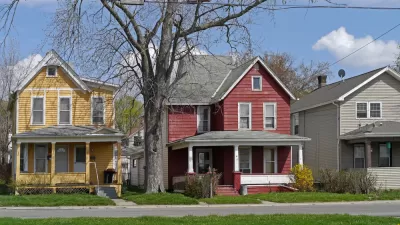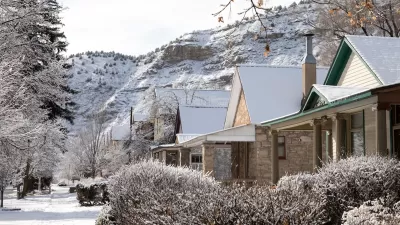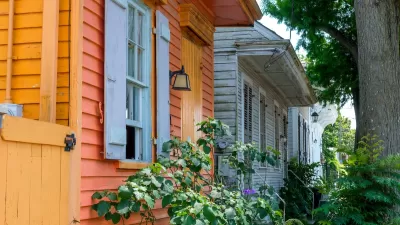Weatherization and efficiency upgrades can reduce energy costs and keep older homes habitable, but many low-income households are excluded from federal funding.

“The nation’s affordable housing crisis has gotten some semblance of attention — with journalists writing stories on the rising cost of rent, the scarce supply of new housing, the looming threat of eviction — but one aspect of the crisis has gone consistently overlooked,” writes Rachel M. Cohen. “On top of the severe housing shortage that currently exists, nearly 6 million homes nationwide have moderate to serious home health hazards.” These hazards will ultimately make the homes uninhabitable, Cohen warns.
“Issues like lead paint, leaky roofs, and knob-and-tube wiring don’t just leave tenants and homeowners in substandard, unsafe housing. They also leave families — mostly poor families — shut out from energy efficiency programs the federal government already funds to upgrade homes.” According to Cohen, “nationally, according to a recently published E4TheFuture analysis, 10 to 30 percent of income-eligible clients are deferred from weatherization upgrades each year for health and safety problems, with those deferrals on the rise.” Cohen argues that “Addressing this problem could help solve both the affordable housing and the climate crisis at once.”
In Pennsylvania, state lawmakers are attempting to do just that with new legislation. “Introduced in March by Democratic state Sen. Nikil Saval, the Whole-Home Repairs Act would provide eligible residents with grants up to $50,000 to make needed home repairs, and small landlords could apply for the same amount in forgivable loans. The bill would also aim to ramp up investments in workforce development, to address the growing shortage of qualified workers able to address the repairs.” The bill could serve as a model for other states and the federal government, Cohen writes. “While the home repairs bill would not itself go toward making energy efficiency upgrades, it would position more homes to be able to access the WAP funds.”
FULL STORY: How to fight the affordable housing and climate crises at once

Manufactured Crisis: Losing the Nation’s Largest Source of Unsubsidized Affordable Housing
Manufactured housing communities have long been an affordable housing option for millions of people living in the U.S., but that affordability is disappearing rapidly. How did we get here?

Americans May Be Stuck — But Why?
Americans are moving a lot less than they once did, and that is a problem. While Yoni Applebaum, in his highly-publicized article Stuck, gets the reasons badly wrong, it's still important to ask: why are we moving so much less than before?

Using Old Oil and Gas Wells for Green Energy Storage
Penn State researchers have found that repurposing abandoned oil and gas wells for geothermal-assisted compressed-air energy storage can boost efficiency, reduce environmental risks, and support clean energy and job transitions.

Greening Oakland’s School Grounds
With help from community partners like the Trust for Public Land, Oakland Unified School District is turning barren, asphalt-covered schoolyards into vibrant, green spaces that support outdoor learning, play, and student well-being.

California Governor Suspends CEQA Reviews for Utilities in Fire Areas
Utility restoration efforts in areas affected by the January wildfires in Los Angeles will be exempt from environmental regulations to speed up the rebuilding of essential infrastructure.

Native American Communities Prepare to Lead on Environmental Stewardship
In the face of federal threats to public lands and conservation efforts, indigenous groups continue to model nature-centered conservation efforts.
Urban Design for Planners 1: Software Tools
This six-course series explores essential urban design concepts using open source software and equips planners with the tools they need to participate fully in the urban design process.
Planning for Universal Design
Learn the tools for implementing Universal Design in planning regulations.
Heyer Gruel & Associates PA
City of Moreno Valley
Institute for Housing and Urban Development Studies (IHS)
City of Grandview
Harvard GSD Executive Education
Salt Lake City
NYU Wagner Graduate School of Public Service
City of Cambridge, Maryland





























